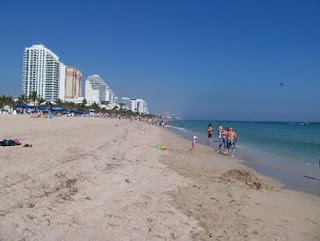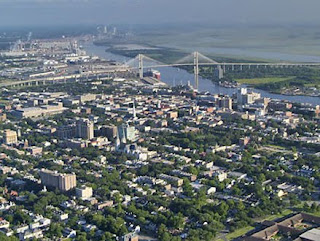 As the Atlantic season comes to an end, U.S. Atlantic coast citizens exhale after the season was labeled a gentle giant. The worst damage in the U.S. consisted of tropical storms in Texas. Other countries were not so lucky. Mexico and Haiti suffered record breaking weather, from their busiest hurricane season in years. Hazard event effects ranged from over 20 deaths, major flooding, and power outages.
As the Atlantic season comes to an end, U.S. Atlantic coast citizens exhale after the season was labeled a gentle giant. The worst damage in the U.S. consisted of tropical storms in Texas. Other countries were not so lucky. Mexico and Haiti suffered record breaking weather, from their busiest hurricane season in years. Hazard event effects ranged from over 20 deaths, major flooding, and power outages.
Monday, November 29, 2010
Atlantic Hurricane Season Ends
 As the Atlantic season comes to an end, U.S. Atlantic coast citizens exhale after the season was labeled a gentle giant. The worst damage in the U.S. consisted of tropical storms in Texas. Other countries were not so lucky. Mexico and Haiti suffered record breaking weather, from their busiest hurricane season in years. Hazard event effects ranged from over 20 deaths, major flooding, and power outages.
As the Atlantic season comes to an end, U.S. Atlantic coast citizens exhale after the season was labeled a gentle giant. The worst damage in the U.S. consisted of tropical storms in Texas. Other countries were not so lucky. Mexico and Haiti suffered record breaking weather, from their busiest hurricane season in years. Hazard event effects ranged from over 20 deaths, major flooding, and power outages.
Thousands Displaced by Heavy Rain
 With thousands displaced by heavy rain, Venezuelan leader Hugo Chavez has opened up one of his palaces to house homeless families. Flooding and mudslides caused about a dozen deaths. Some praise Chavez for his generosity, others are critical. In my opinion, if Chavez is willing to help the people in Venezuela, then let him. If there was no assistance for residents of a country after a hazard event, then the country would suffer from lack of recovery.
With thousands displaced by heavy rain, Venezuelan leader Hugo Chavez has opened up one of his palaces to house homeless families. Flooding and mudslides caused about a dozen deaths. Some praise Chavez for his generosity, others are critical. In my opinion, if Chavez is willing to help the people in Venezuela, then let him. If there was no assistance for residents of a country after a hazard event, then the country would suffer from lack of recovery.
Sunday, November 21, 2010
Insurance for Three Islands
Approximately 12.8 million was payed out from insurance to islands in the eastern Caribbean for Hurricane Thomas damage. After the devastated damage from Hurricane Ivan in 2004, Caribbean leaders set up insurance agreements for the islands. If the wind speeds surpass an island's threshold, the insurance is triggered. Haiti was not eligible because it was not hit by threatening enough winds. Island insurance is an interesting concept. I wonder if the Marshal Islands could get insurance of some sort to protect the residents from losing their identity and rights. Improving their protection against future hazard events was a wise decision on Caribbean leaders' parts. They definitely learned from Hurricane Ivan.
Monday, November 15, 2010
Loss from Natural Disasters Could Triple by 2100
This article discusses future environmental hazard conditions. As the world population grows, so will the hazard risks. The fastest growing populations are statistically in areas at higher risk of hazard damage. Officials must consider methods of protection because it will pay off financially. Things suggested include better infrastructure protection for buildings such as hospitals, buffering methods such as planting mangroves along coastal regions, and reviewing rent on buildings. Many property owners fail to consistently maintain buildings, leading to a higher risk of collapse in severe weather. The content of this article shows that it's more financially responsible to prevent the hazard than paying for the after effects. The after effect expenses are usually the higher ones.
Top 5 Hurricane Vulnerable and Overdue Cities
This article caught my attention because it describes 5 cities that we don't consider when thinking about places at risk of hurricanes. Yet these five places are in or near the usual hurricane hotbeds and it seems like only time will tell us what kind of damage is possible.

#1 Miami/Ft. Lauderdale
The center of a hurricane has not impacted this area since 1950. Because hurricanes aren't common in this area, the population as well as development is within 20 miles of the coastline. This puts Miami/Ft. Lauderdale at higher risk of more damage from a hazard event.

#2 New York City
In years past, hurricanes generally moved northeastern past New York. If a hurricane did happen to hit the Big Apple, it would cause a storm surge unlike anyone in the city has ever seen. The skyscrapers in the city are especially vulnerable to high winds. Vertical shelter isn't a great
option for residents to escape potential flooding.

#3 Tampa Bay
Tampa Bay is vulnerable due to its extremely developed coastline. As a popular tourist and vacation place, the city is at even greater r
isk of devastation from a hazard event. The lack of hurricane events also leads to a low experience level, leaving residents even less prepared for dealing the effects during and after. T
he last hurricane that went through and caused significant damage was in 1921.

#4 Savannah, GA
Savannah hasn't been hit by a hurricane since 1893. If one developed and followed the same pattern as Hurricane Floyd from 1999, it would have devastating effects on the Georgia coastline.

#5 Atlantic City, NJ
The last time a hurricane hit Atlantic City, NJ was in 1903, meaning this city is more likely to be hit in the near future. The city is characterized by numerous high rises and is on barrier coastal land. The population isn't as high as other coastal cities, but the risk still remains.
http://www.weather.com/outlook/weather-news/news/articles/top5-most-vulnerable-overdue-hurricane-cities_2010-07-14
Subscribe to:
Comments (Atom)